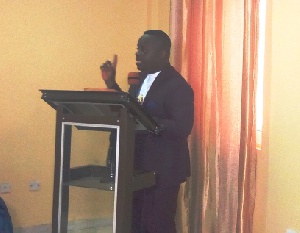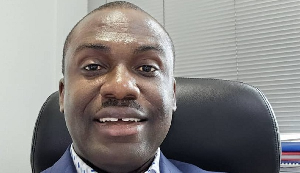HEALTHBASE International, a Non-Governmental Organization has launched its 2019 Action Campaign Project with a call on NGOs in the country to do away with the habits of taking undue advantage of the vulnerable to their advantage to raise funds for their personal enterprises.
The Executive Director of HEALTHBASE International, Rev. Nathan Perry Mensah has expressed great worry over activities of some NGOs that are in the habit of taking undue advantage of people to raise funds.
According to him, the act has become a strategy being adopted by some “unscrupulous NGOs” in our system.”
Rev. Nathan Perry Mensah was speaking during the official launch of the NGO’s 2019 Action Campaign Project in Accra.
He said NGOs are also part of the demographic society and are seen as agents that will bring solutions to areas where government cannot be able to meet at its full length hence their actions are very important to the growth and development of the society.
He mentioned that many people are no longer willing to open up to NGO's because they have been deceived severally by a number of them.
He revealed that their survey over the past five years during the implementation of their projects across the country, it was discovered that most people have had their names written, invited to workshops to give fake credence to the work of those NGO’s and even to the extent of doing videos with their families under the guise of gaining financial assistance.
He revealed that the situation where able-bodied people were carried in wheelchairs as disabled people to convince donors to support them have become so rampant in the society all due to poor monitoring on the part of donor agencies.
Rev. Nathan Perry Mensah also mentioned that the issues of HIV/AIDs prevalence have been downplayed by some of these NGOs who have over the years compute figures which are not commiserated with the facts on the ground.
He said some of the prostitutes that HEALTHBASE International came to contact with expressed regrets, detailing their predicament on different platforms and videos for those NGOs because they were not given the juicy financial assistance they were promised.
“And it is the reason most of them had to go into prostitution again. This situation affects the work of hardworking NGOs who are working well for the good of mother Ghana,” he said.
He said: “Other people who can have no problems with their sight have equally been used as blind folks to attract funding. Most research institutions must understand that when you compute and project figures to suit your whims and caprices, it impacts negatively on the nation.”
Rev. Nathan Perry Mensah also touched on fake health statistics and averred that these statistics are dangerous.
According to him, accurate data on the incidence, prevalence, morbidity and mortality rates of a particular disease or otherwise helps a nation to know the strategies to adopt and systems to employ.
Field research, he mentioned must be taken seriously by research coordinators because it unravels astonishing details all the time.
“It is quite unfortunate to be projecting health statistics which has no reflection on the reality on the ground but rather to please donor agencies for more funding,” he said and charged donor agencies to devise ways of conducting proper monitoring and evaluation on projects they have invested in, to ensure that funds are not diverted into other areas of personal enterprise.
He also said the habit of bribing people to fill questionnaires at all cost whether they relate to the research bracket or not in matters requiring personal interactions must be a thing of the past.
The Executive Director of HEALTHBASE International said this will dent the country’s progress as a nation and derail its prospects if nothing is done to nip it in the bud.
“Many research sectors of our economy are equally guilty of questionable research practices, withholding analytical details and modifying results to improve outcomes,” he added.
HEALTHBASE International which has begun its operations some five years ago, carried out several community projects as well as education and sensitization drives in schools including Junior High Schools, Senior High Schools and some Second Cycle Institutions.
The Executive Director said the NGO will continue in that drive for their 2019 project and lay much emphasis on Sexually Transmitted Diseases and Chlamydia which is one gray area that majority of NGOs in health are not so much focused in.
He also mentioned that his NGO will as well; focus on sensitizing the young ones on the Human Papillomavirus (HPV) which is the most common sexually transmitted infection.
According to him HPV is usually harmless and goes away by itself, but some types can lead to cancer or genital warts since it is a viral infection that is passed between people through skin-to-skin contact.
“There are more than 100 varieties of HPV, 40 of which are passed through sexual contact and can affect your genitals, mouth, or throat. HPV is the most common sexually transmitted infection that affects both men and women. It’s so common that most sexually active people will get some variety of it at some point, even if they have few sexual partners,” he explained.
Rev. Nathan Perry Mensah said most people get HPV through direct sexual contact, such as oral sex and because HPV is a skin-to-skin infection, intercourse isn’t required to contract the infection.
“In rare cases, a mother who has HPV can transmit the virus to her baby during delivery. One thing we need to know is that warts associated with most HPV infections go away on their own without any signs or symptoms. But the virus is still in an infected person’s body. As a result, that person may unknowingly pass HPV to sexual partners.
When the virus doesn’t go away on its own, it can cause serious health problems. These include genital warts and warts in the throat (known as recurrent respiratory papillomatosis),” he said.
According to him, HPV can also cause cervical cancer and other cancers of the genitals, head, neck, and throat and cancers caused by HPV often don’t show symptoms until the cancer is in later stages of growth.
“That is why we encourage regular screenings to help diagnose HPV-related health problems earlier. This can improve the outlook and increase chances of survival,” he said.
Regional News of Monday, 25 February 2019
Source: Prosper Agbenyega







![Isaac Kwadwo Ampong [L] and President John Mahama Isaac Kwadwo Ampong [L] and President John Mahama](https://cdn.ghanaweb.com/imagelib/pics/549/54996138.295.jpg)





